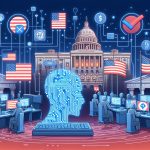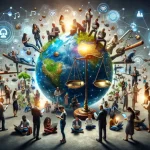Introduction
Power has shifted from parliaments to platforms. In today’s world, technology, celebrity, and digital communication shape how influence travels, who holds attention, and what stories define public opinion. Governments are learning to compete not only in global markets but also in online narratives that determine trust and authority.
The rise of social platforms and artificial intelligence has made fame more accessible and influence more volatile. A viral tweet can move markets, while an AI-generated image can spark political controversy. The line between leadership, storytelling, and manipulation has blurred — and the world is still learning how to manage it.
Technology as the New Political Arena
Politics has entered a digital revolution. Campaigns now rely on AI-driven data analytics to identify voter preferences, target messages, and predict outcomes. These tools help politicians make precise decisions — but they also open doors to misuse and manipulation.
The digital arena allows even small movements to gain global momentum. Hashtags can become revolutions overnight. Yet, with this power comes responsibility — leaders must balance connectivity with accountability, ensuring technology builds trust instead of eroding it.
Celebrity Influence Beyond the Screen
Celebrities have become modern diplomats. From Kim Kardashian’s advocacy for prison reform to Emma Watson’s push for gender equality, fame now doubles as a platform for social impact. Their reach transcends borders and traditional media, reshaping how activism looks in the 21st century.
However, fame is fragile when tied to public perception. While genuine activism inspires, superficial gestures often spark backlash. The difference lies in purpose — when stars engage with depth and authenticity, their influence drives lasting change.
The AI Effect on Truth and Perception
Artificial intelligence now edits headlines, writes music, and generates realistic videos that can fool millions. This capability raises questions about authenticity, journalism, and democracy. As AI-generated media grows, truth itself becomes harder to verify.
Societies must adapt fast. AI can be an ally — automating tasks, improving communication, and expanding creativity — but it must also be watched carefully. Transparency and regulation are key to preserving reality in a world flooded with digital illusions.
Media Wars and Global Power Shifts
In the global media landscape, control of information equals control of perception. Nations like the U.S., China, and Russia are engaged in digital competition, using media influence as a soft-power weapon. The winner is not the country with the loudest voice but the one with the most credibility.
Yet, the internet has leveled the playing field. Independent journalists and citizen reporters challenge mainstream narratives with fresh perspectives. The fight for attention is no longer about reach — it’s about trust, accuracy, and impact.
Tech Giants and Ethical Challenges
Companies like Meta, Google, and X (formerly Twitter) are now as influential as governments. Their platforms dictate global communication, regulate speech, and even influence elections. This unprecedented power demands greater ethical responsibility.
Regulations are slowly catching up. Governments worldwide are creating laws to manage data privacy, misinformation, and AI usage. The future depends on striking a balance between innovation and accountability to ensure that progress doesn’t come at the cost of integrity.
Pop Culture’s Digital Evolution
Pop culture has become the reflection of digital life. From AI-generated songs to virtual influencers, entertainment now mirrors the blend of technology and creativity. Every new platform creates a fresh space for storytelling, fandoms, and cultural connection.
But this evolution also challenges authenticity. Fans expect real emotion in a world full of digital perfection. The next era of pop culture will belong to creators who embrace both technology and transparency, connecting through humanity rather than algorithms alone.
FAQs
How has technology changed global politics?
Technology has made politics faster and more data-driven, enabling instant communication but also heightening risks of misinformation and manipulation.
Why do celebrities have so much political influence today?
Celebrities reach massive global audiences, often influencing opinions and sparking activism in ways traditional politicians cannot.
What is the biggest concern about AI in media?
The spread of deepfakes and synthetic content threatens truth and trust, making it harder for audiences to distinguish fact from fiction.
How are tech companies shaping democracy?
Tech giants control online speech, access to information, and data, giving them immense power over what people believe and how they vote.
Can pop culture drive positive change in the digital age?
Yes — when pop culture uses its reach to promote awareness and empathy, it helps society navigate the ethical and emotional challenges of technology.
Conclusion
Technology, fame, and global politics are no longer separate worlds — they are one interconnected system defining modern influence. The digital stage rewards visibility, but it also demands responsibility. Every post, innovation, and statement has ripple effects across the globe.
As the boundaries between human and machine-made influence continue to blur, one truth remains: authenticity is power. The future of global leadership will not depend on who has the most followers or advanced algorithms, but on who uses them wisely to build trust, inspire change, and protect truth in an increasingly digital age.










